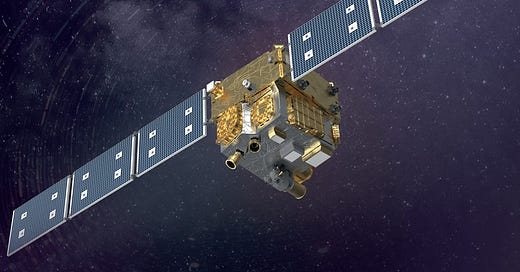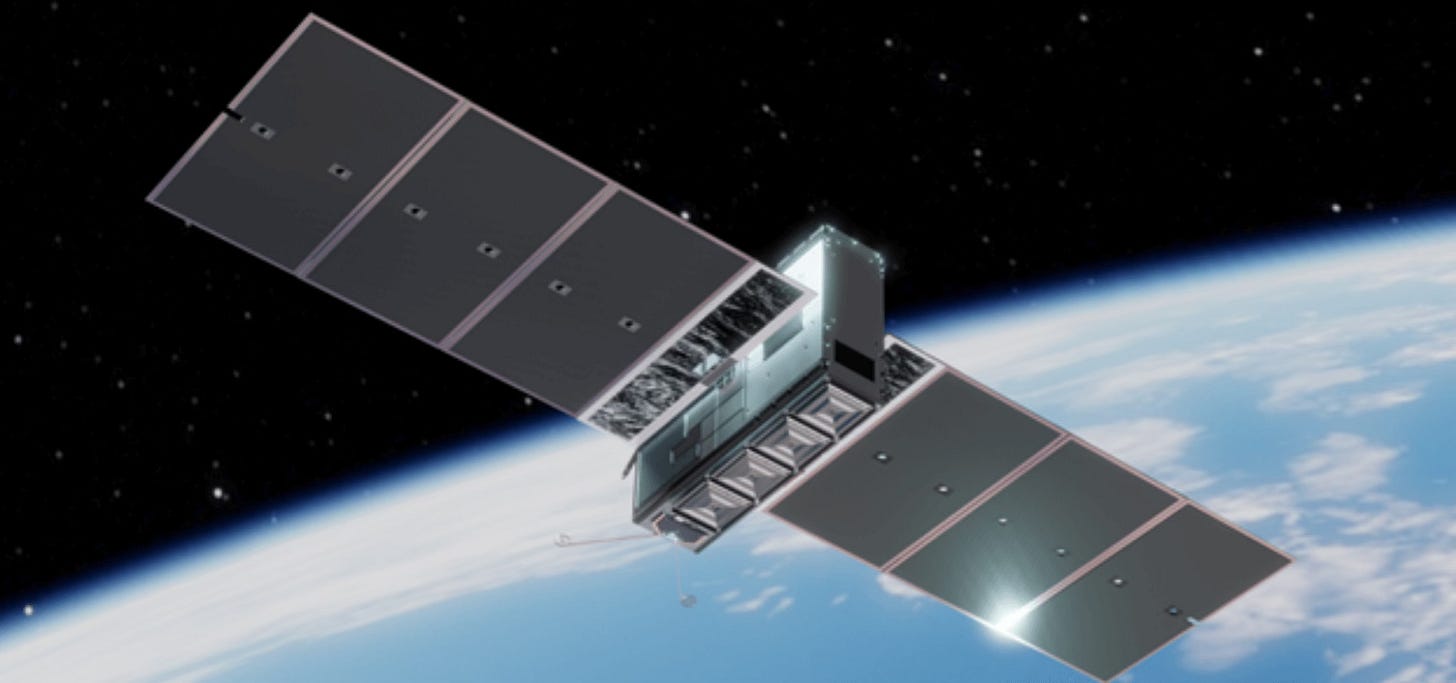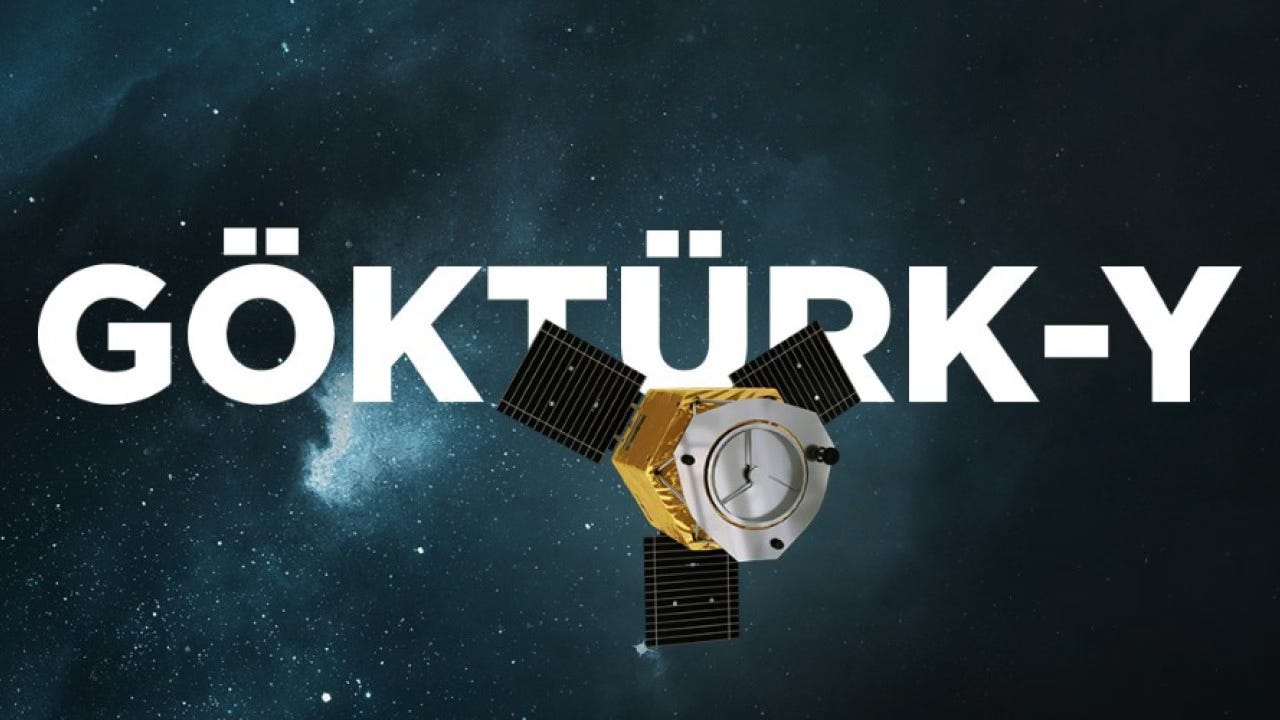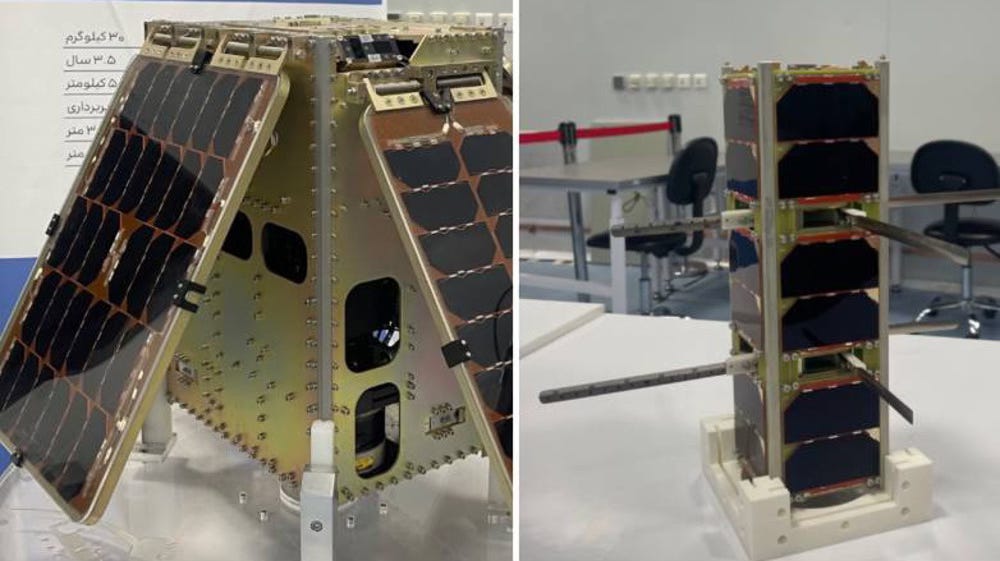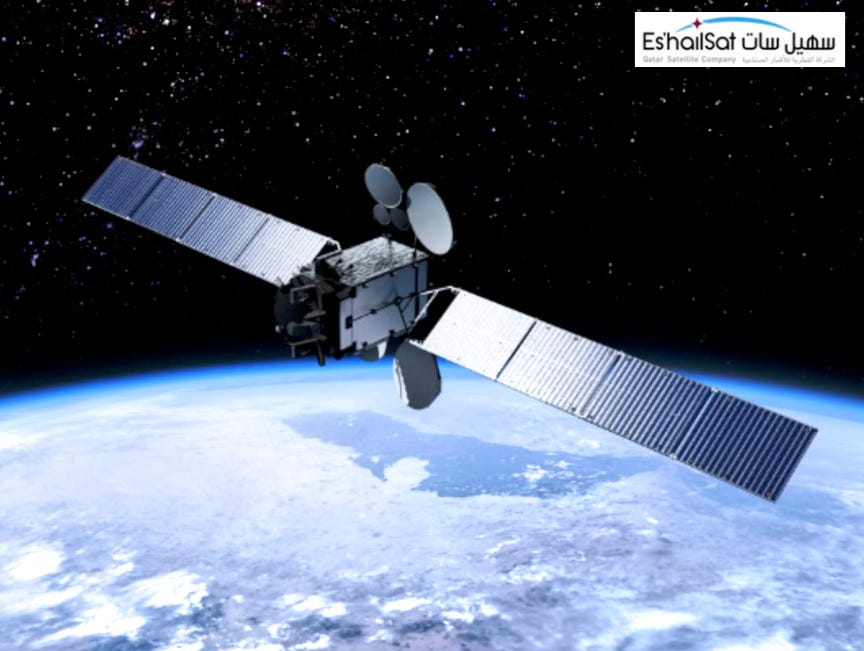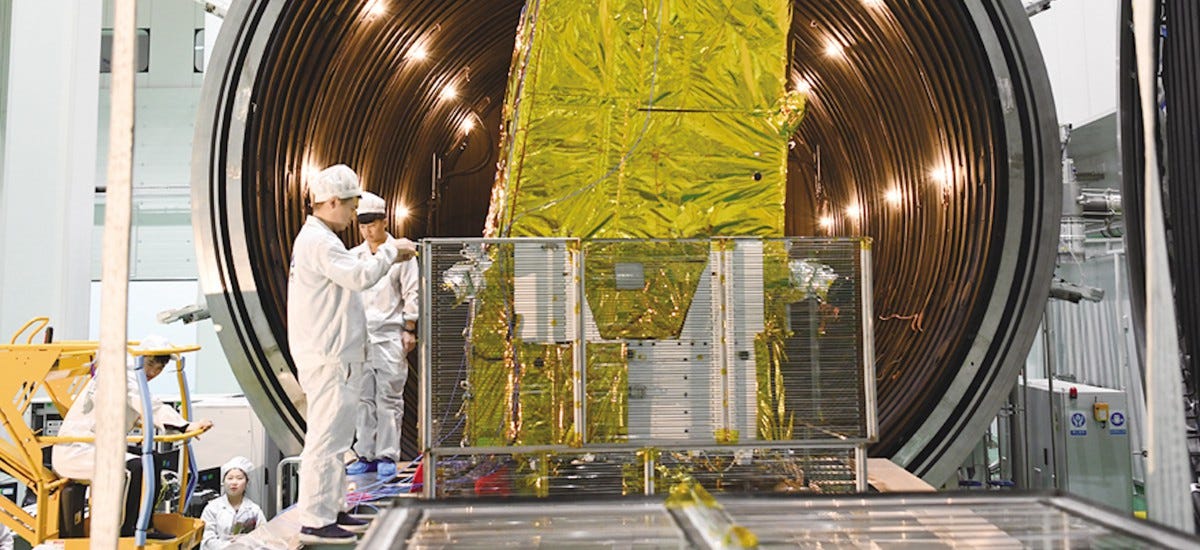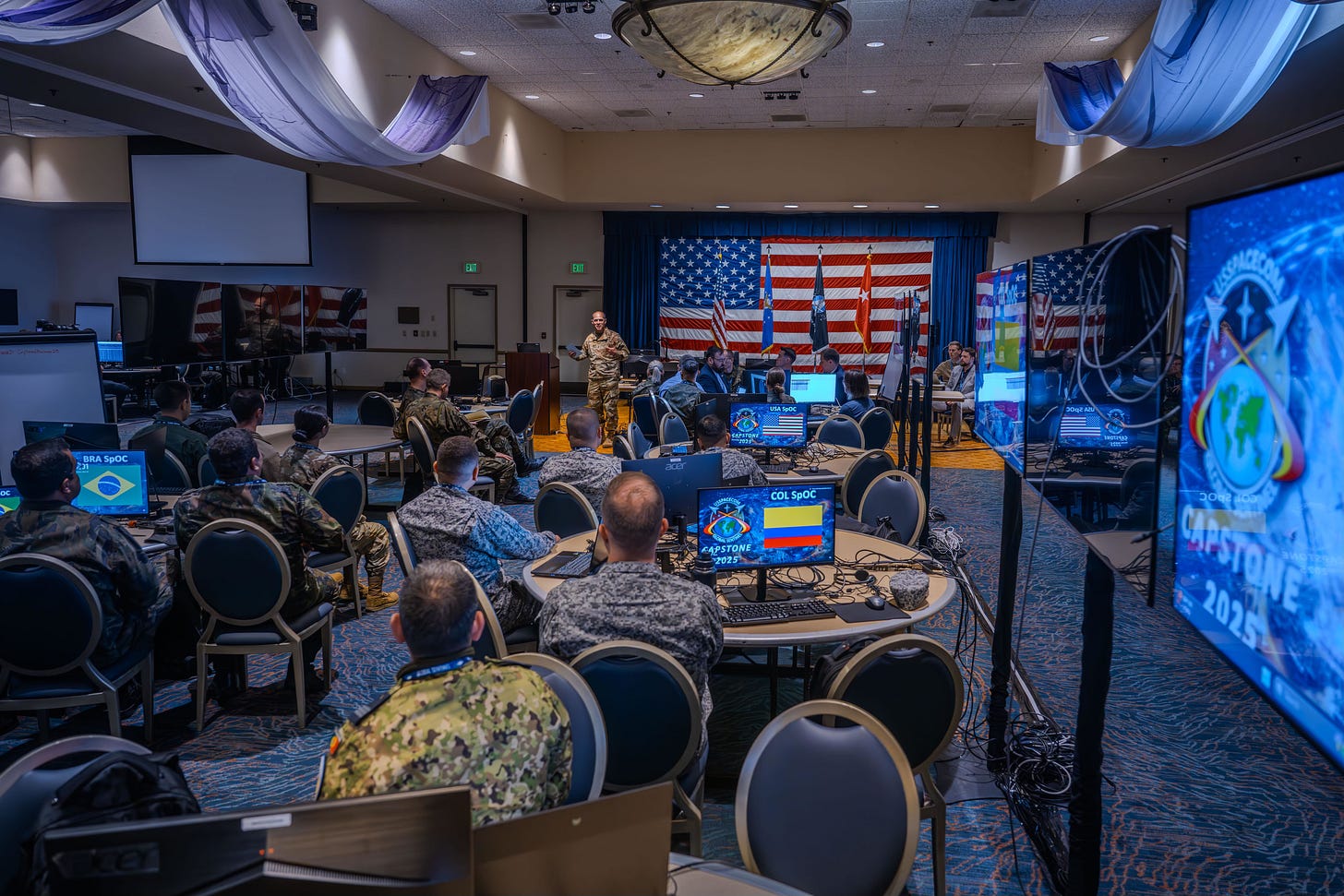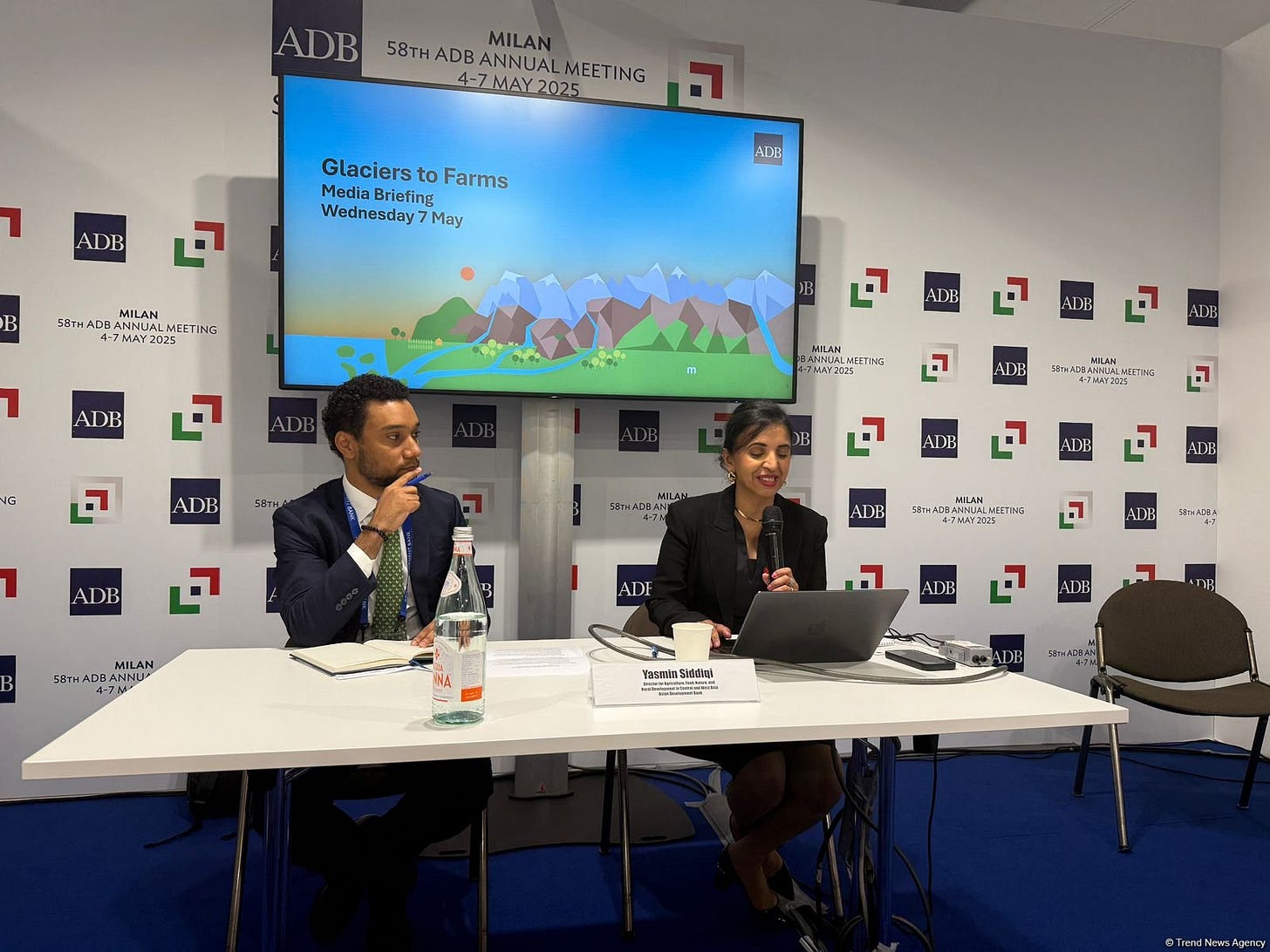Middle East Space Roundup: 5 to 11 May 2025
A summary of all the space news in the Greater Middle East over the past week, brought to you by AzurX
The following are the major space developments in the Greater Middle East region tracked by Middle East Space Monitor over the past week:
UAE Space Developments
UAE-Led Arab Satellite 813 Program Completes System Integration Review
The Arab Satellite 813 Program, a flagship initiative led by the UAE to foster pan-Arab cooperation in space, has successfully completed its System Integration Review (SIR), marking a critical milestone ahead of final environmental testing. Spearheaded by the UAE Space Agency and the National Space Science and Technology Centre (NSSTC) at UAE University, the review confirmed the satellite's subsystem readiness, platform-payload integration, and testing protocols. Backed by the Arab Space Cooperation Group and unveiled by Sheikh Mohammed Bin Rashid Al Maktoum, the project embodies the UAE's strategic vision to unify Arab efforts in advanced space industries. Once operational, the satellite will support regional environmental monitoring, natural resource assessment, and scientific research, bolstering Arab capabilities in Earth observation and sustainable development.
UAE Still Committed to NASA’s Artemis Program, Despite U.S. Funding Uncertainties
At GLEX 2025 in New Delhi, India, UAE space officials reiterated their commitment to NASA’s Artemis program amid growing uncertainty over U.S. funding, with Salem Al Marri, Director General of the Mohammed Bin Rashid Space Centre (MBRSC), emphasizing the UAE’s flexible and proactive approach as it continues development of the Gateway airlock module. While NASA’s proposed budget would halt future Artemis missions beyond Artemis-3, potentially impacting UAE, Canadian, European, and Japanese contributions, Al Marri affirmed the UAE’s readiness to adapt and sustain collaboration. The conference also sparked discussions about restructuring global space partnerships beyond traditional U.S.-led frameworks, with France’s CNES and ESA advocating for deeper cooperation with emerging partners such as the UAE, India, and Canada. The UAE’s strategic positioning and agile diplomacy underscore its rising influence in international space exploration dialogues.
UAE’s Space42 Demonstrates D2D SATCOM With Denmark’s Gatehouse SATCOM
The UAE’s Space42 has announced a successful demonstration of direct-to-device (D2D) satellite connectivity through its subsidiary Thuraya in collaboration with Denmark’s Gatehouse SATCOM, marking a significant milestone for global 3GPP-compliant NB-IoT applications over L-band geostationary satellites. This proof-of-concept validated Release 17 standards and underpins the upcoming launch of Thuraya Direct, a messaging and IoT service set for commercial deployment in Q4 2025. The project aligns with Space42’s strategy to leverage open-standard technologies, scale mission-critical applications, and address underserved sectors like energy, agriculture, and transportation. It reinforces Thuraya’s leadership in satellite mobility and positions Space42 to play a pivotal role in the commercialization of D2D services globally.
UAE: French NewSpace Companies Seeking Emirati Investments
France is leveraging its diplomatic channels in the UAE to attract investment into its underfunded New Space sector, with Ambassador Nicolas Niemtchinow hosting a high-level networking event on 8 May 2025 in Abu Dhabi. Major French aerospace players such as Airbus, Thales, and Exotrail will join emerging startups like Aldoria and Geoflex to engage with key Emirati stakeholders including Space42, FADA, and the Mohammed Bin Rashid Space Centre (MBRSC). The event aims not only to position French companies for lucrative contracts—particularly in response to Abu Dhabi’s active Earth observation satellite tenders—but also to secure Emirati investment to offset a domestic financing shortfall. The initiative mirrors broader French-UAE strategic cooperation in critical technologies such as AI, following the UAE’s recent pledge to invest up to $50 billion in France’s AI ecosystem.

UAE’s Leap 71 Aims to Revolutionize Rocket Engine Manufacturing Through AI and Additive Techniques
UAE-based AI engineering firm Leap 71 is scaling up its 3D-printed rocket engines to rival the size and power of SpaceX’s Raptor engines, aiming to revolutionize propulsion system development through AI-generated designs and metal additive manufacturing. Using its proprietary AI model “Noyron,” the company can autonomously generate engine designs and software instructions for thrust and propellant management, directly printable into hardware. Leap 71 is transitioning from 30cm-diameter engines for lunar vehicles to near two-meter-wide meganewton-class engines for orbital launches, leveraging recent advancements in large-volume 3D metal printing—mostly from China. The firm’s ambition includes establishing a rocket engine factory in the UAE to support the country’s space agenda, though the absence of local test stands remains a constraint. With partnerships like the one with Europe’s The Exploration Company, Leap 71 seeks to democratize access to advanced propulsion by drastically reducing cost and development time, potentially reshaping the global rocket engine supply chain.
Saudi Arabia Space News
Saudi Arabia’s Maaden Sign Contract With Tahreez & Australia’s Fleet Space Technologies JV
Maaden, Saudi Arabia’s mining giant, has signed a four-year exploration contract with a joint venture between Fleet Space Technologies and Tahreez to survey over 12,000 km² of high-priority tenements in the Arabian Shield, leveraging cutting-edge space and AI technologies. The partnership—aligned with Saudi Arabia’s Vision 2030—will deploy Fleet Space’s ExoSphere platform, which combines ambient noise tomography, active seismic techniques, and AI-driven drill targeting powered by a proprietary LEO satellite network and smart ground sensors. Already used by Rio Tinto and Barrick, this low-impact, high-resolution 3D imaging system will enable real-time, deep subsurface exploration up to 7km, enhancing Maaden’s data intelligence and operational efficiency. The deal builds on a January MoU and follows Fleet Space’s $100M Series D round and its acquisition of HiSeis. Looking ahead, Fleet also plans to deploy a lunar variant of ExoSphere, SPIDER, by 2026—signaling the growing convergence of Earth-based mining and space exploration.
Saudi Arabia’s Neo Space Groups Expresses Doubts on SATCOM D2D Strategies
Saudi Arabia’s Neo Space Group (NSG), established by the Public Investment Fund as a national champion in space technology, has shifted its strategy away from offering broadband to unmodified smartphones, deeming the business model currently uneconomic. Instead, NSG is decoupling its broadband and IoT services, redirecting its IoT focus toward narrowband messaging applications—aligning with approaches taken by Apple and Globalstar, and under development by Iridium Communications. This pivot underscores NSG’s pragmatic approach to market realities as it refines its position within the global space-based connectivity landscape.
Neo Space Group Major Part of Saud Arabia’s Aviation Sector Growth
Saudi Arabia’s aviation sector is experiencing unprecedented growth as part of Vision 2030, with flagship initiatives like Riyadh Air preparing for launch, flynas planning an IPO after record profits, and regulatory liberalization opening charter markets. Concurrently, the Kingdom is advancing its space ambitions through Neo Space Group (NSG), a Public Investment Fund-backed company, which is debuting as an inflight connectivity (IFC) provider with its Skywaves system. Developed in collaboration with Display Interactive and leveraging SES’s multi-orbit MEO/GEO Open Orbits platform, Skywaves is already being installed on aircraft for major international carriers, offering high-speed broadband and integrated digital services. NSG’s entry into the aero-ISP market, coupled with its strategic SATCOM, geospatial, and PNT capabilities, positions it as a linchpin in both Saudi aviation modernization and the broader national space ecosystem.
Saudi Arabia’s Neo Space Group Appoints Aurélien Fougerard as CSO
Neo Space Group (NSG), Saudi Arabia’s leading commercial space services provider and a Public Investment Fund (PIF) company, has appointed Aurélien Fougerard as Chief Strategy Officer to drive its global strategic agenda and accelerate growth in the Kingdom’s expanding space and satellite sector. With over 16 years of experience in top-tier consulting—including as a Partner at Boston Consulting Group—Fougerard brings deep expertise in aerospace, defense, and private equity. His appointment signals NSG’s intent to strengthen its leadership team and reinforce its role as a national champion aligned with Saudi Arabia’s broader ambitions in space innovation and global competitiveness.
Türkiye Space Developments
Türkiye’s GÖKTÜRK-Y Reconnaissance Satellite to be Completed This Year
Turkish Aerospace Industries (TUSAŞ) is rapidly advancing Türkiye’s ambitions in space through a comprehensive suite of satellite programs, infrastructure development, and domestic technology innovation. In an interview, TUSAŞ General Manager Dr. Mehmet Demiroğlu outlined progress on key projects including the high-resolution GÖKTÜRK-Y satellite (targeted for 2029), the SAR-enabled GÖKTÜRK-3 (set for 2030), and a self-funded microsatellite slated for launch in 2027, while emphasizing the strategic value of the USET test center and indigenously developed subsystems. TUSAŞ’s growing capability portfolio—ranging from electro-optical components to flight control software and structural panels—supports Türkiye’s broader space-defense integration, particularly in Network-Centric Warfare applications for platforms like the KAAN fighter and UAVs. As TUSAŞ expands its production of satellite-qualified hardware and enhances its competitive positioning globally, the company is positioning Türkiye as a serious contender in both civil and defense space domains.
Türkiye Starts Work on Türksat-7A Communications Satellite
Türkiye is advancing its strategic position in space through the development of its first domestically-produced communications satellites, Türksat-6A and the upcoming Türksat-7A, marking a significant leap in national satellite manufacturing capabilities. Türksat-6A, described by Minister of Transport and Infrastructure Abdulkadir Uraloğlu as a milestone achievement, has positioned Türkiye among a select group of countries capable of producing indigenous communications satellites. Building on this, Türksat-7A aims to further elevate the country's technological self-reliance and global competitiveness, with a strong emphasis on domestic industry participation and engineering innovation. These projects are central to Türkiye’s broader space strategy, which prioritizes expanding digital infrastructure, increasing geopolitical influence, and fostering public-private-academic collaboration. As coverage areas expand and service offerings grow, Türkiye is poised to enhance its international stature as a digital and space technology provider.
Iran Space News
Report: Iran Has Formally Joined China’s International Lunar Research Station Initiative
Iran has formally joined China's International Lunar Research Station (ILRS) initiative and will contribute a scientific payload to the Chang’e-8 mission, marking a significant step in Tehran’s ambition to integrate into major global space efforts. The payload, developed by an Iranian academic institute, will study static electric potential on the Moon’s surface—critical data for future lunar exploration and resource utilization. This collaboration reflects China's broader space diplomacy through the ILRS, a China-Russia-led alternative to the U.S.-backed Artemis program, and underscores Iran’s strategy to advance space science and extraterrestrial resource engagement under its 10-year national roadmap.
Iran Building Assembly, Integration, & Testing Facility for “Heavy” Satellites
Iran’s Space Research Center is set to complete a critical Assembly, Integration, and Testing (AIT) facility for heavy satellite payloads by early 2026, signaling a major step toward supporting larger and more complex satellite missions. According to Center Head Vahid Yazdanian, the facility will serve not only Iran’s domestic space projects and academic institutions but also offer services to regional partners, enhancing Iran’s international collaboration potential. As the ninth country to achieve independent orbital launch capability, Iran continues to strengthen its civilian space infrastructure despite enduring Western sanctions, positioning itself as a growing player in the global space ecosystem.
Iran’s Omid Fazaa to Launch Combined IoT & Imaging Satellite With Russia
Iranian space startup Omid Fazaa is set to launch its third in-orbit demonstration satellite, Two See One, mid-year aboard a Russian Soyuz rocket, marking a significant step toward a dual-purpose satellite constellation combining IoT connectivity and precision agricultural imaging. Following separate test missions—Hodhod for IoT, which is fully operational, and Kowsar for imaging, which faced ground station communication issues now reportedly resolved—Two See One integrates both missions into a single platform and serves as the first unit of the planned Two-Nama constellation. CEO Hussein Shahabi confirmed successful compatibility tests with the launch vehicle and outlined plans for up to seven demonstration units before full deployment. The project reflects Iran’s emerging private space sector ambitions, but Shahabi highlighted regulatory and institutional support gaps that could hinder broader innovation.
Qatar Space Developments
Qatar’s Es’hailSat to Broadcast Syria’s Al-Ekhbariya TV on Es’hail-2
Qatar’s Es’hailSat has expanded its satellite broadcasting services by partnering with Syria’s state broadcaster ORTAS to carry Al-Ikhbariya TV across the Middle East and North Africa via the Es’hail-2 satellite at 26° East. This move enhances Es’hailSat’s regional content portfolio and reinforces its role as a key enabler of public broadcasting in the Arab world. The agreement includes additional services via Es’hail-1 and teleport infrastructure in Doha, offering Al-Ikhbariya increased reach and technical support. The collaboration aligns with ORTAS’s mission to disseminate government-aligned news and programming in Arabic, English, and French across the MENA region.
Qatar Airways to Rollout Starlink IFC SATCOM on 32 Routes in June 2025
Qatar Airways will become the first airline in the Middle East—and the largest globally—to introduce SpaceX’s Starlink high-speed satellite internet on board, offering complimentary ultra-fast connectivity on over 32 routes starting June 2025. With promised speeds of up to 500 Mbps and uninterrupted gate-to-gate access, the service will significantly enhance the in-flight digital experience. This strategic move positions Qatar Airways at the forefront of aviation connectivity innovation, reinforcing its leadership in deploying advanced space-enabled technologies across its global network.
Other Regional Space News
Opinion: Chinese Firm That Supplied Satellite Imagery to Houthis Exemplifies Growing Geopolitical Complexity of Space power
Chang Guang Satellite Technology (CGST), a Chinese state-linked firm, exemplifies the growing complexity of spacepower in geopolitical competition, blending commercial agility with deep ties to the Chinese Communist Party and military. Accused by U.S. officials of supplying satellite imagery to Yemen’s Houthi rebels and previously blacklisted for aiding Russia’s Wagner Group, CGST denies involvement but markets capabilities—including ship tracking—that suggest otherwise. Formed in 2014 as a joint venture with China’s Academy of Sciences and backed by the PLA, CGST has rapidly grown into a major satellite imagery player, with a Jilin constellation now totaling 117 satellites and plans to expand to 300. Despite a canceled IPO and financial setbacks, CGST remains a formidable force in global Earth observation, operating under China’s military-civil fusion doctrine and quietly serving both civilian and defense agendas. Its role in potential dual-use satellite services raises strategic concerns for governments and commercial actors alike.
Report: Algeria Seeks Closer Space & Satellite Relationship With U.S., Distances Itself From Russia
Algeria is recalibrating its strategic posture by seeking deeper cooperation with the United States, including in space and satellite domains, as it distances itself from a historically close defense relationship with Russia. Amid growing tensions over Moscow’s military activities in the Sahel and Libya, and the erosion of Russian technological credibility due to the war in Ukraine, Algeria is turning to U.S. capabilities in radar systems, space surveillance, and intelligent systems. This shift builds on prior satellite cooperation—such as U.S. satellite monitoring of Algeria's energy infrastructure during its 1990s civil war—and signals Algeria’s intent to diversify its technological partnerships. The new generation of Algerian military officers, trained globally, increasingly values advanced space-based assets, highlighting how satellite and space systems are becoming central to Algeria’s evolving defense and foreign policy strategy in a competitive geopolitical landscape.
Israel Participates in U.S. Space Command’s Global Sentinel 2025 Space Security Exercise.
Israel joined 28 other countries and NATO at Global Sentinel 2025, the U.S. Space Command’s flagship space security cooperation exercise held at Vandenberg Space Force Base. The two-week event focuses on enhancing space situational and domain awareness, operational coordination, and responsible behavior in space. Israel’s participation underscores its growing role in international space collaboration, contributing to simulated scenarios that span the full spectrum of space operations, from standard launches to counterspace threats. Through its involvement in leadership panels, workshops, and Regional Space Operations Centers, Israel continues to deepen its integration into multinational efforts aimed at securing the global space domain.
Azerbaijan to Receive ADB Satellite Support for Smarter Water Management
The Asian Development Bank (ADB) is set to support Azerbaijan with satellite technology for smarter water management under the Glaciers to Farms initiative, launched at COP29 in partnership with the Green Climate Fund. The initiative focuses on assessing glacier and snow melt impacts on the Kura River Basin and their implications for Azerbaijan’s water resources. ADB aims to integrate satellite data and remote sensing to enhance irrigation efficiency, optimize river basin management, and support farm-level water application, aligning with government efforts to consolidate farmland and modernize irrigation infrastructure. This marks ADB’s first major water resource initiative in Azerbaijan, reflecting a strategic shift toward climate-resilient, tech-enabled agricultural and environmental policy support in the region.
Bahrain Space Agency Launches Space Science Educational Outreach Initiative
The Bahrain Space Agency (BSA) has launched an educational outreach initiative targeting Ministry of Education teachers, aiming to embed space science awareness into the national curriculum and align with Bahrain’s Economic Vision 2030. Through a series of lectures delivered by BSA engineers and geospatial experts, the program showcased the Kingdom’s space achievements, highlighted the value of satellite data for national development, and promoted the integration of space-based insights into education. The initiative underscores BSA’s strategic commitment to cultivating a space-literate society, fostering local talent, and reinforcing Bahrain’s role as an emerging space sector leader in the Gulf region.
Upcoming Events
SATExpo Middle East 2025 Takes Place 13 to 15 May 2025 in Dubai, UAE
SATExpo Middle East 2025 will debut from 13 to 15 May 2025 at Dubai World Trade Centre as the region’s premier space and satellite industry event, spun off from CABSAT to meet growing demand for a dedicated innovation platform. Anchored by the UAE’s National Space Strategy 2030 and expanding public-private investment, SATExpo will convene over 140 international exhibitors and 8,000 senior stakeholders from aviation, energy, telecom, government, and defense. Featuring the SATExpo Summit, "Innovation Capsule" deal-making platform, and sessions with leaders from MBRSC, Es’hailSat, and EgSA, the event will spotlight AI-driven applications, tech localization, and SME empowerment, reinforcing Dubai’s ambition to be a global hub for space commerce and policy innovation.
Other Regional Space News in Brief:
Azercosmos, Azerbaijan’s national space agency, has signed a technical support contract with Malaysia-based Park Place Technologies to maintain infrastructure for the Azerspace-1 satellite;
Saudi Arabia and France discussed bilateral industrial and commercial cooperation in Paris, including aerospace manufacturing;
Be sure to catch up with space activities in the region in the next edition of Middle East Space Monitor’s space roundup!

